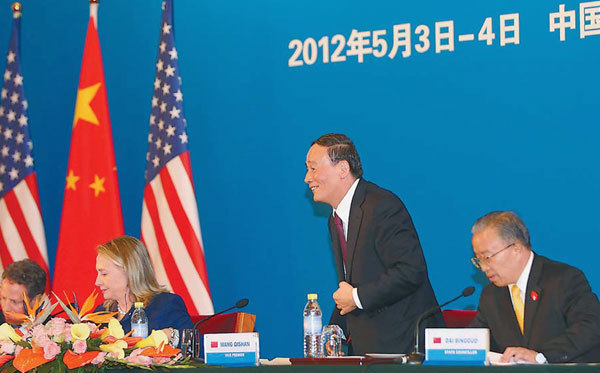China, US reach broad consensus at dialogue
 0 Comment(s)
0 Comment(s) Print
Print E-mail China Daily, May 5, 2012
E-mail China Daily, May 5, 2012
China, US reached 67 agreements at the two-day strategic and economic dialogue, covering a wide range of issues in the macro economy, bilateral trade and investment as well as financial cooperation.
The United States will quicken its examination and approval for Chinese financial institutions that apply to invest in the US, as part of the achievements in the fourth round of the China-US Strategic and Economic Dialogue.
Both delegations said on Friday that they were deeply encouraged by the results, while President Hu Jintao said there have been "significant agreements" in this round of talks.
"There is significant progress in financial cooperation between the US and China," said Vice-Minister of Finance Zhu Guangyao.
According to Zhu, the US is now quickening its examination and approval process on the Bank of China and Agricultural Bank of China's applications for opening more branches in the US and the Industrial and Commercial Bank of China's initiative to take over Bank of East Asia (US).
In 2010, the Industrial and Commercial Bank of China, the world's largest lender by market value, completed the acquisition of a 70-percent stake of Bank of East Asia Canada to expand its business in North America.
China will revise regulations to allow foreign investors to raise their stakes in joint venture securities companies and joint venture futures companies to as much as 49 percent.
Foreign investors' ownership in securities firms is capped at 33 percent.
"This is a signal from China's policymakers to further open financial markets," said Sun Zhe, a professor at Tsinghua University's department of international relations. "But the two countries should further quicken the process of promoting bilateral trade and investment."
Morgan Stanley and JPMorgan Chase are among US banks that may gain more control over underwriting operations in China, the second-biggest market for share sales in 2011 after the US, according to data compiled by Bloomberg.
Goldman Sachs Group and UBS AG are the only foreign firms to currently have management control over their local ventures.
"We welcome this policy change, which we believe will create new business momentum and help further enhance China's securities industry and capital markets," Li Xu, a spokeswoman for Morgan Stanley, was cited by Bloomberg as saying.
China has made significant and promising reforms to its currency regime that will lead to further appreciation of the yuan against the dollar and other major currencies over time, US Treasury Secretary Timothy Geithner said on Friday.
"China has acted to move toward a more flexible exchange rate system in which the market plays a greater role. It is intervening less in exchange markets. China is also moving to liberalize controls on the international use of its currency and on capital movements into and out of the country," Geithner said.
Moreover, the US said it is committed to loosening restrictions on high-tech exports to China soon.
According to Yukon Huang, a senior associate at the Carnegie Endowment for International Peace and the former World Bank country director for China, the US restrictions on high-tech exports to China are extremely rigid.
"It doesn't make much sense from a national security point of view as China can easily get them from somewhere else," Huang said.







Go to Forum >>0 Comment(s)